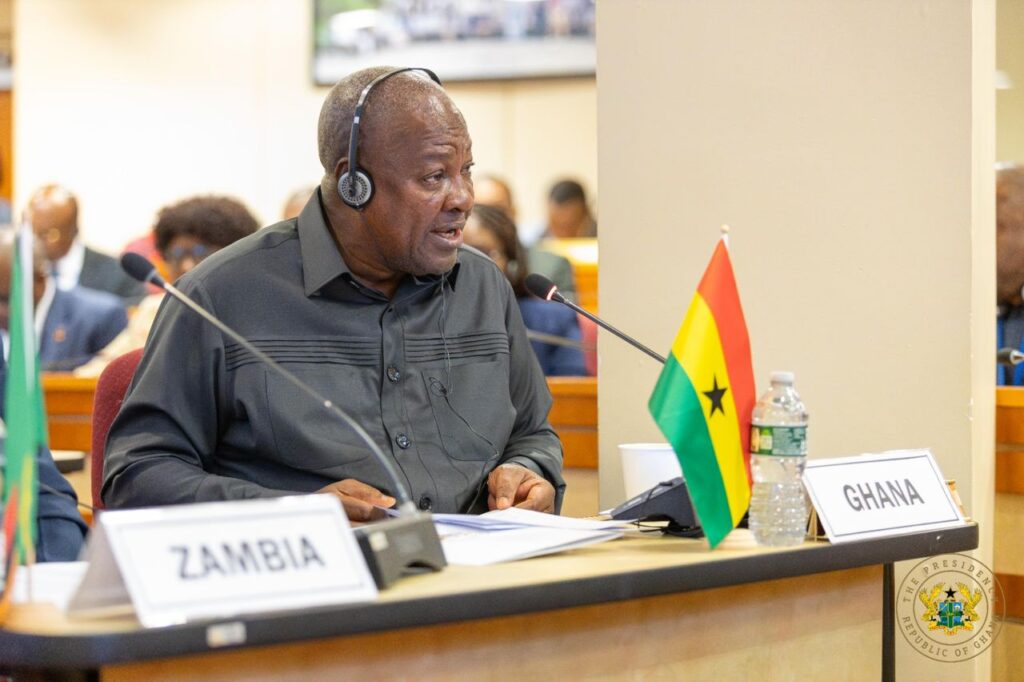By Prince Ahenkorah
The President of the Republic of Ghana, John Dramani Mahama, has urged global leaders to empower women, stating that when women succeed, families thrive, communities become stronger, and nations progress.
He made this call while addressing a global leaders’ meeting on women in Beijing, China, on October 13, 2025.
The President mentioned that the meeting presented an invaluable opportunity to reaffirm the shared commitment to advancing the rights of women and girls worldwide and to assess the progress made under the Beijing Declaration and Platform for Action.
He said that thirty years on, the promise of Beijing still endures, but it calls for renewed urgency and purpose.
The Beijing Declaration, he explained, was never just a statement of intent; it was a moral covenant and a recognition that no nation can truly progress if half of its population is left behind.
Yet, the President said, reviews of its implementation have shown that persistent gaps and structural barriers continue to slow the collective march toward equality.
He therefore urged global leaders to act with greater resolve and innovation, affirming that Ghana remains steadfast in its pursuit of gender equality and the empowerment of women.
Mahama highlighted the role his government is playing in empowering women in Ghana, stating that under his leadership and in his capacity as the African Union Champion for Gender and Women’s Empowerment, the Government of Ghana has taken decisive steps to mainstream gender across national development policies.
He pointed out that Ghana has achieved historic milestones, including the election of the country’s first female Vice President and the unprecedented appointment of women to leadership positions in government, the judiciary, the security services, and key national institutions.
These, the President reiterated, are not symbolic gestures but deliberate affirmations that women deserve a seat at the highest levels of decision-making.
Mahama expressed confidence that in the near future, Ghanaian women will break the glass ceiling and that a woman will become President of the Republic of Ghana.
The President also noted that Ghana has achieved gender parity in school enrollment, with more girls now going to school and staying in school.
He said the government’s commitment is further demonstrated by robust institutional reforms and legal frameworks designed to protect the rights of women and girls.
Ghana, he noted, has strengthened critical agencies, including the Ministry of Gender, Children and Social Protection, the Domestic Violence and Victim Support Unit of the Ghana Police Service, the Domestic Violence Secretariat, and the Specialized Domestic Violence Courts.
Sustained budgetary allocations, he added, have improved their capacity to deliver justice, protection, and social support to survivors of gender-based violence.
The President further explained that his government has expanded several social protection programmes that directly benefit women and girls.
Among these are the Livelihood Empowerment Against Poverty (LEAP) initiative, which targets female-headed households, and the Ghana School Feeding Programme, which sources food locally and improves nutrition and school retention, especially for girls.
He also mentioned that his government has implemented a policy reserving 50% of microfinance and small-loan funding for women entrepreneurs.
Mahama highlighted the distribution of free sanitary pads for schoolgirls to address menstrual health and prevent absenteeism, as well as the provision of free tertiary education for persons with disabilities, particularly women, and the introduction of a “No Academic Fee Policy” for first-year tertiary students.
The President emphasized that these interventions are anchored in strong legal and policy frameworks, citing the enactment and revision of key instruments, including the Revised National Gender Policy (2025–2034), the Ghana National Social Protection Act, the Domestic Violence Act (2007), the Human Trafficking Act (2005), and the Justice for Children Policy.
He also referenced the Affirmative Action (Gender Equity) Act, 2024 (Act 1121), which mandates a minimum of 30% female representation in public appointments by the end of 2026, 35% by 2028, and 50% by 2030.
To further empower women economically, Mahama announced the establishment of a Women’s Development Bank to provide low-interest loans, financial literacy training, and business development support for women entrepreneurs.
He stated that this initiative aims to promote financial inclusion and create more opportunities for women across all sectors of the economy.
The President warned that the rapidly changing global order threatens to reverse the gains made under the Millennium Development Goals and the ongoing Sustainable Development Goals.
He observed that the global multilateral order and rules-based trading systems are being undermined by unilateral actions from some global players, stressing the need to safeguard the progress made by women and other vulnerable groups since the Beijing Conference thirty years ago.
Mahama underscored that the African woman remains particularly vulnerable and used the platform to call on his fellow African leaders to prioritize the welfare and empowerment of women.
He concluded by stressing that gender equality is more than a matter of justice; it is a catalyst for sustainable development. He reaffirmed that when women succeed, families thrive, communities become stronger, and nations progress, adding that Ghana’s experience demonstrates that investing in women yields tangible benefits in productivity, innovation, and social cohesion.


